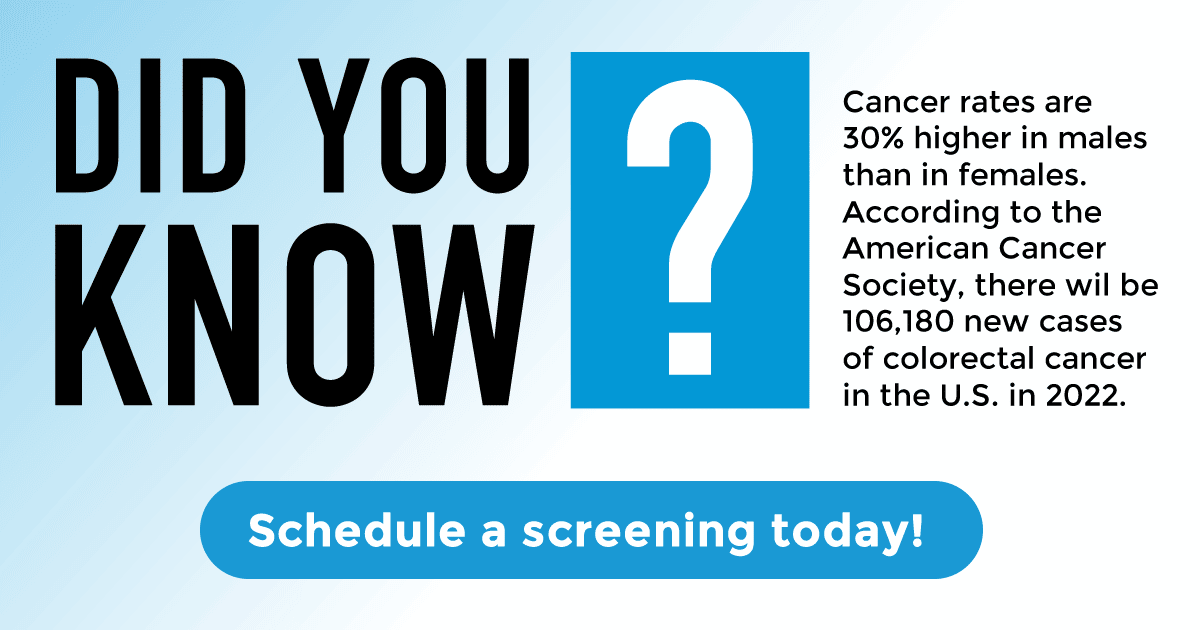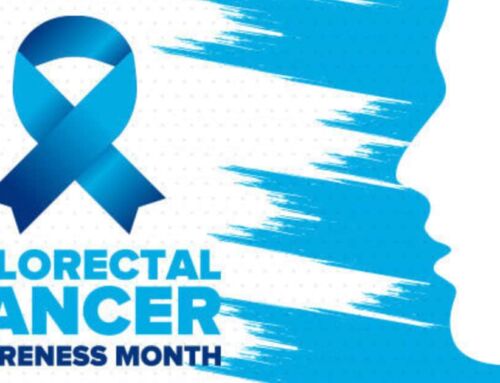June is Men’s Health Month. This national observance brings awareness to preventable health conditions that men may experience and encourages early detection through regular medical checkups. Men’s Health Month also promotes healthy lifestyle habits, which can reduce the risk of many diseases.
In most countries worldwide, men have a lower life expectancy than women. Men also have a greater risk of health conditions such as heart disease, hypertension, diabetes, and cancer. This includes colon cancer. Bringing awareness to men’s health can hopefully help bridge this gap in healthcare.
Like many conditions, colon cancer is preventable with screening and early detection. Keep reading to learn more about colon cancer in men and how you can reduce your risk.
Colon Cancer Facts for Men
Alarmingly, colon cancer is the fourth most common cancer and the second leading cause of cancer death in the United States. In 2022 alone, an estimated 151,030 people will be diagnosed with colon cancer, and 52,580 people will die from this disease.
Colon cancer is more common in men than in women. The rate of colon cancer in men is 43.4 per 100,000 cases per year. Whereas the rate of colon cancer in women is 32.8 per 100,000 cases per year.
More men will die from colon cancer than women. The death rate for colon cancer in men is 16.0 deaths per 100,000 men per year. In comparison, the death rate for colon cancer in women is 11.3 deaths per 100,000 women per year.
Colon cancer affects people of all ages. About 1 in 23 (4.3%) men and 1 in 25 (4.0%) women will develop colon cancer in their lifetime.
Common Symptoms of Colon Cancer
The symptoms of colon cancer vary depending on many factors, such as the location and stage of cancer. In most cases, colon cancer causes no symptoms at all.
Common symptoms of colon cancer include:
- Abdominal pain or cramping
- Blood in the stool, which may cause the stool to appear dark red, brown, or black
- A change in bowel habits such as diarrhea, constipation, or pencil-thin stools
- Incomplete emptying of the bowel or a feeling that you haven’t finished a bowel movement
- New-onset weakness or fatigue
- Rectal bleeding or bright red blood on the stool
- Unexplained weight loss
Many of these symptoms can occur with conditions other than colon cancer, such as inflammatory bowel disease and irritable bowel syndrome. If you have any of the above symptoms, it’s important to see your doctor as soon as possible to find the correct cause and treatment.
When to Get Screened for Colon Cancer
For most men, colon cancer screening should begin at 45 years of age and occur every 10 years. But your doctor may recommend screening earlier or more frequently if you have an increased risk of colon cancer.
Men with the following risk factors are at an increased or high risk of colon cancer:
- A family history of colon cancer or polyps
- A personal history of inflammatory bowel disease
- A hereditary colon cancer syndrome such as familial adenomatous polyposis (FAP) or Lynch syndrome
- A personal history of radiation to the abdomen or pelvic area for prior cancer treatment
If you possess any of the above risk factors, you should talk to your doctor to determine when to begin screening.
The Best Test for Colon Cancer Screening
A colonoscopy is the gold-standard test for colon cancer prevention. This is because a colonoscopy cannot only diagnose colon cancer but it can also remove it.
Most colon cancers begin as polyps, or precancerous clumps of tissue, that grow on the colon’s inner lining. Precancerous polyps usually grow for several years before they turn into cancer.
A screening colonoscopy can detect precancerous polyps and remove them before they become cancerous. This can prevent colon cancer from occurring altogether. Moreover, a screening colonoscopy can locate colon cancer in its earliest stages, leading to better treatment outcomes.
Treatment is often successful if colon cancer remains localized to the colon and hasn’t spread to other parts of the body. An early diagnosis of colon cancer has a 90.9% 5-year survival rate.
How to Reduce Risk Factors for Colon Cancer
Colon cancer screening is the most effective way to prevent colon cancer. But you can also reduce your risk of colon cancer by practicing healthy lifestyle habits.
Many risk factors for colon cancer are preventable, such as:
- Smoking. Men who smoke tobacco are more likely to develop colon cancer than men who don’t smoke. Quitting smoking can lower your risk of colon cancer.
- Alcohol consumption. Light to heavy alcohol intake can increase your risk of colon cancer. Men who don’t drink or limit their alcohol intake to 2 drinks per day can lower their risk of many types of cancer, including colon cancer.
- A sedentary lifestyle. Men who live a sedentary lifestyle have a greater risk of colon cancer. Regular moderate to vigorous exercise can help protect against colon cancer.
- Obesity. Men who are overweight have a higher risk of colon cancer than women who are overweight. Maintaining a healthy weight can reduce the risk of colon cancer in men.
- An unhealthy diet. A Western diet or a diet high in red meats and processed meats increases the risk of colon cancer. Eating a diverse, plant-based diet that’s rich in fiber can reduce inflammation in the gut and lower the risk of colon cancer.
Don’t Become a Preventable Statistic
Men’s Health Month is a reminder to prioritize your health by receiving regular medical checkups and practicing healthy lifestyle habits. With Father’s Day quickly approaching, it’s an excellent opportunity to encourage the men in your life to schedule preventative healthcare.
The importance of essential health screenings like colon cancer screenings cannot be overstated. A colonoscopy is the best way to prevent colon cancer and detect the disease before it spreads. The key to beating colon cancer is early detection.
Dr. Havranek offers an Open Access scheduling option to make scheduling a colonoscopy a little easier by allowing qualifying patients to forgo an office visit before their colonoscopy. Following the screening guidelines and spreading awareness to friends or loved ones who are 45 years or older can help prevent colon cancer and save lives.
Don’t become a preventable statistic. Get screened for colon cancer.
For additional information about colon cancer or other digestive health conditions, you can request an appointment online or call our office at 210-615-8308.




